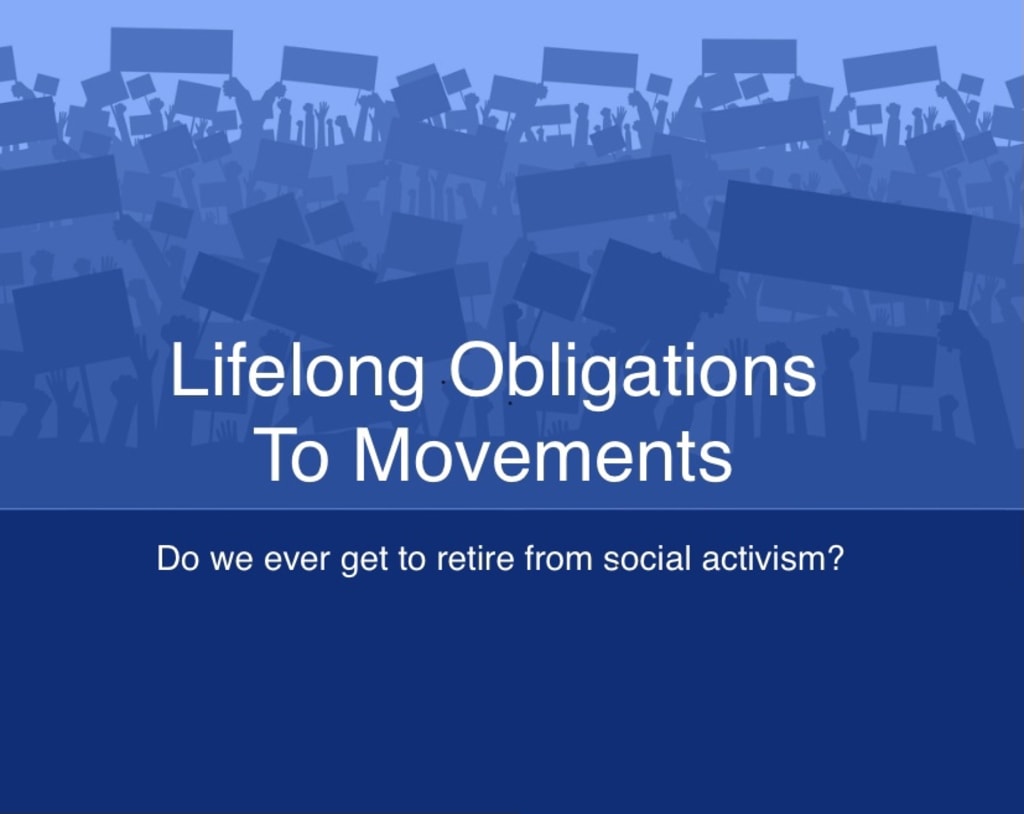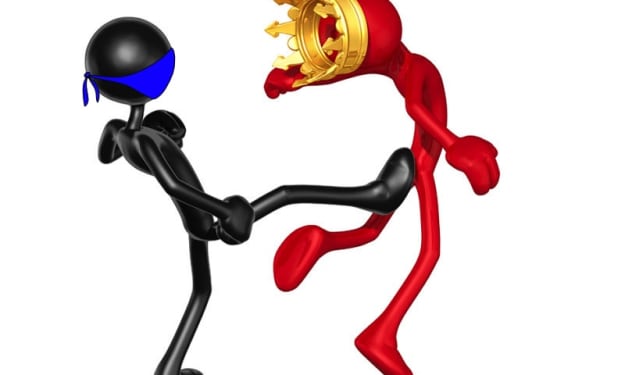Lifelong Obligations To Movements
Do we ever get to retire from social activism?

Questions about Life-Long Obligations to Movements
Written by Laura Flores - December 15, 2020
If Martin Luther King Jr. were still alive today, would he be allowed to retire? At what point are we done advocating for causes, preaching about our movements, and pushing the envelope to make the next generation better off? Is it permitted to set a goal, achieve it, and then carry on with life without spending every waking moment finding more causes to stand behind?
To the first question, the answer is “probably not.” The achievements garnered from his influence made him a figurehead, a voice, a symbol, and a guiding light. His ability to give a speech makes him a treasure all on its own, and if you add in the inroads he made into abolishing segregation and racism, he’s practically the eighth wonder of the world. So could he retire? Absolutely not. He would be on his deathbed, saving his last breath to leave a message supporting his causes, and even then, his gravestone would serve in his stead.
I bring this up because my grandparents were part of that movement. They marched alongside Martin, went to his rallies, and supported his campaigns monetarily and in person. As middle-class white people in the mid-1900s, they certainly had privilege and power than affected those in their social circle. My grandfather was a Nasa engineer as well, so he would have had the opportunity to put his beliefs into practice and set examples in the workplace.
However, the last great movement my grandparents ever participated in was the Great Peace March in the 1980s. My grandmother joined a band of like-minded peace-loving volunteers and set off across the United States on foot. They pitched tents in the rainy dark, under humid night skies, and shivering in snowy twilight. They carried banners proclaiming their desire for peace, and they did so without the promised backing of businesses that pulled out at the last minute. My grandmother later wrote out her journey in “Peace Like a River,” where she describes how young her grandchildren were, leaving you with a glimpse of something important that she gave up in the name of this great cause.
Fast-forward decades later to the 2010s -- they have great-grandchildren now -- when LGBTQ+ rights are being tested and advocated by groups, not unlike those my grandparents were part of in the fight for racial freedom. One holiday evening, a blip of news popping up on the T.V., and their views on this new movement become clear. Their faces are equal parts horrified and confused. I watch them glance at each other, muttering quietly. I know they understand homosexuality is now acceptable, and even if they aren’t sure they are totally on board, they aren’t unkind. They would never suggest oppressing people, but accepting them is not the same. Push the envelope further to transsexuality, and they are lost. How are they supposed to process this? What in the world does it mean to change genders? To go even further -- how is this at all related to Martin Luther King Jr? Why would they even think about their life choices from decades ago?
The answer to that last question is complicated: they should think about it because even if they don’t understand or can’t accept a group’s needs, they are still suffering from oppression. That last part makes the answer complicated. Many believe LGBTQ+ people are making a choice or just need new programming. I’ll play devil’s advocate for a moment here: who cares if they choose? What does it matter whether they were born that way or ended up that way from trauma or how their parents raised them? They are people, and regardless of these profoundly personal (and private) life choices, they don’t deserve to have their rights taken. It’s the same battle with a different name. Right?
I’ve had many LGBTQ+ people tell me racism and feminism are different fights. They deny any similarity between their rights and the rights of people based on gender or skin color. The LGBTQ+ fight is personal, and it’s jammed into the psyches of all fighting for scraps of gender and sexual freedom. They’re right -- we can’t simplify their battle to just “equality,” it runs deeper in society than gender and skin color. As long as the lizard-brained society we all live in believes it owns our gender and sexuality, any choice beyond the binary will be oppressed, restrained, ignored, and harmed.
So should my grandparents have joined the LGBTQ+ fight instead of squinching their noses? If they were totally behind it, would late-80s white middle-class people even be heard, especially in light of ageism? If they could be a voice, should they be allowed to hang their “Hat of Causes” up in the closet and watch from the side-lines? At what point does someone who’s advocated for so much in their life get to say, “Enough, I draw the line here, I will leave this to the younger generations.” As their starry-eyed granddaughter, do I have the right to be offended that they don’t seem to understand the plight of this oppressed group?
I’d like to say I have all the answers, but as you can see, I’ve filled this article with more questions. I have learned that one cause is not the same as another, no matter how simple you try to make the problem. A fight for “equality for all” is too broad; it’s too difficult to slip past prejudice. We can be part of more than one movement, we can fight for more than one group, but we can’t expect someone who fights for one group’s freedom to fight for another’s.
We also need to honor our ancestors’ achievements, appreciate what they have taught us and do our part to carry on their traditions. They can fight as long as they need to, and we can join and pick up where they have left off. As I’ve often told others, change starts with our youth, and each generation past a movement snowballs the impact. Still, do they get to stop advocating just because they’re old? Are there other ways to push for change that don’t involve money or weekends?
Yes, absolutely yes. Remember, equality doesn’t look the same to everyone. Freedom is as subjective as peace. Racism is still a fight, and LGBTQ+ people have banded together to remove society’s ownership of our bodily autonomy. It might all be “Freedom” or “Equality” or “Peace,” but we can’t fight ambiguous enemies. We need to be specific and targeted to make those baby steps, generation after generation, decade after century. So even if you plan to retire after achieving one of the goals your causes have advocated for, such as same-gender marriage or legally changing your assigned gender, you still must carry on the torch of freedom. Carry it with you in everything you do: from getting dinner for your family to choosing who to promote at work. You might not feel the effects within your lifetime, but you’re helping build a better world for those to come. Even if you’re not entirely sure about the next group fighting for their version of equality, you must continue fighting for the overarching goal of equality for all.
I have faith, a dream like Martin Luther King Jr’s, of equality for all. Someday we will finally own our bodies.
About the Creator
SNROCINUTAF
Anti-Authoritarian Making Gandhi Sound Like Rush Limbaugh






Comments
There are no comments for this story
Be the first to respond and start the conversation.